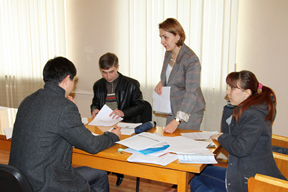
July 2014—Because “monotowns”—towns dominated by a single factory or industry—are vulnerable to economic disruptions, Kazakhstan is working to diversify its local economies.
USAID’s Diversification of Monotown Economies (DOME) program is helping to create jobs; develop micro, small and medium enterprises; and strengthen organizations that support entrepreneurship in six monotowns in Kazakhstan’s Karaganda region: Abay, Saran, Satpayev, Shakhtinsk, Temirtau and Zhezkazgan.
In 2010, the Government of Kazakhstan initiated the Business Road Map–2020 program to promote entrepreneurship in non-oil sectors of the economy. The program, implemented by the Entrepreneurship Development Fund “Damu,” subsidizes interest rates and provides service support to local businesses. To support regional development, the Fund opened 12 entrepreneurship support centers in single-industry regions in 2013.
The DOME program works closely with the Fund and its support centers in targeted monotowns, which depend mainly on ferrous and nonferrous metallurgy as well as coal mining. DOME provides training on strategic and business planning, finances for non-financiers, marketing and sales, quality management basics, tax and law, and human resource management. By providing training to business service providers, the project helps to grow local businesses as well as provide critical services to the region’s citizens.
Tatyana Khassanova started the Center AT company in 2000 to provide foreign language classes for children and adults. Since then, her company has provided translation services and has organized language camps and an international exchange program for specialists who want to improve their qualifications.
Khassanova was one of the first 15 trainees who completed DOME’s Training of Trainers course in February 2014. Following the training, her company started offering new services in April such as trainings on marketing, strategic business planning and human resources. Since then, she has conducted six trainings for 84 small and medium enterprise owners in monotowns. The first training on human resources attracted 26 local entrepreneurs, business representatives, and association and government employees.
Having launched this successful new business venture with USAID support, Khassanova continues to help empower entrepreneurs and develop the local economy. And by empowering entrepreneurs like Khassanova, USAID is also helping to diversify local economies in Kazakhstan.
“The situations faced by entrepreneurs that we reviewed during the training helped me in making decisions for my own company. I learned a lot of helpful information,” said Marina Rudak, director of the Mari Tour Company, who attended a human resource management training in Temirtau, where her travel agency is located.
The DOME program, which is implemented by PYXERA Global, runs from July 2013 to July 2016. To date, 34 local business consultants have been trained and certified on business essentials; 77 young entrepreneurs have presented their ideas at a business case competition; 114 employees of small and medium enterprises have attended trainings; and five small and medium enterprises have received strategic action plans.
LINKS
Follow @USAIDCtrAsia, on Facebook, on Flickr, on YouTube







Comment
Make a general inquiry or suggest an improvement.